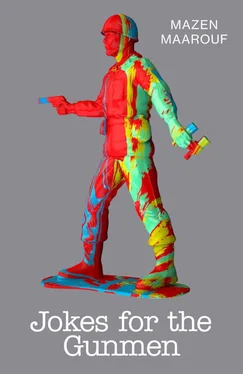On the way home I swallowed my own vomit twice and when I arrived I had wrenching pains in my guts. I went into the bathroom and vomited. The vomit tasted very acidic and the acidity seemed to have damaged my throat or my oesophagus, because some blood came out too. That made me think of the pain my father must have felt when his arms lost all that blood I had seen.
In the hospital we were told that my father hadn’t died, but he had lost both his arms. He was in bed, with those broad shoulders of his, rather like a robot superhero whose arms had been cut off after a brutal battle with villains. But as soon as he came around from the anaesthetic he asked me in a frail voice, ‘Where’s the gramophone?’
‘It got smashed, papa. There’s nothing left of it,’ I said.
He looked at his amputated arms, as if the loss of the gramophone had reminded him that disaster had also struck his own body. ‘So I don’t need my arms anyway,’ he joked.
While my mother was wiping away her tears, I was summoned to the hospital reception desk, where I was given the gramophone handle and signed my name on a piece of paper. That was all that was left of the old machine. But my father changed shortly after he came back home. He had suffered some psychological damage. I hid the gramophone handle from him and didn’t mention it to him. He just stared at my arms and my mother’s arms, without looking at our eyes or faces. He spoke to us only through our arms. He focused his gaze on them so much that you felt that your hand was smeared with shit or that there was something wrong with it, and you had to put your hands in your pockets immediately, or hide your arms completely inside your sweater, leaving the sleeves hanging empty, like when we played at being beggars on the stairs as kids.
He would sometimes ask us questions such as: ‘How do you feel when you look at me? Tell me honestly. How do you feel? Isn’t it a privilege to have two arms? And your mother? She must feel the same way, mustn’t she?’ Sometimes he would ask me to move my arms in a particular way. ‘Lift your arm up high, and then drop it down as if it’s dead,’ he would say. And I would reply, ‘Stop that, Dad.’ Or he would ask me to stand behind him and let my arms hang down so that my arms looked like they were his arms. Standing like this, we would move together to the mirror and he would take a long look at his own reflection, which now had my arms. ‘Your arms fit my body perfectly, don’t they? No wonder we’re father and son,’ he would say. This was painful to me. I had to obey him, as if I were still a child. My father started to become very irritable. As for my mother, she felt she was being punished, because my father had stopped sleeping with her but she couldn’t abandon him. ‘People would start talking, gossiping. They would see me as a bad woman,’ she said.
My father also made a point of shitting and pissing in bed, so my mother started buying nappies for him and making him wear them. She washed his balls and ass, and shaved his beard with an electric razor because he didn’t trust her with a razor blade in her hand. My attempts to convince him that he should trust her didn’t succeed. ‘Your mother used to have a lover when I worked in the bar,’ he said. ‘You don’t know anything.’
In the end my father and I fell out, and since then we haven’t exchanged a single word. My father had seen a medical programme on television about limb transplants, for arms and hands, for example. He called me into his room, which he never left. When I came in, he said meekly, ‘I’m going to make a request that no father has ever asked of his son. If you agree, you’ll gain everyone’s respect – relatives, your friends and the neighbours. Everyone in the neighbourhood will respect you if you do this for me.’
‘Of course, Dad,’ I replied. ‘You know I’d be willing to do anything.’
I had left school after my father had the accident and I’d worked as a carpenter’s apprentice. Now I was a partner with two friends in a furniture factory, and I was ready to do everything in my power to fulfil my father’s wishes.
‘I want you to donate one of your arms to me,’ he said. ‘They said on television that it’s medically possible.’
I couldn’t believe that my father was asking me for an arm. I said nothing. I was thinking of that vacuum bomb and the gramophone. I wished I had lost my arms instead of him, and at that very moment, as if he could read my thoughts, my father said, ‘If you had lost your arms, I would donate one of my arms to you without hesitation. What’s an arm worth compared to me seeing you happy, or you seeing me happy?’
‘I agree with you that this is a request no father has ever asked of his son,’ I said. ‘It’s totally original ,’ I added, pronouncing the last word in the French style in a tone that was both sarcastic and sad. I tried to convince him that it was impossible: ‘What if the operation was a failure? Then I would have lost my arm.’
He exploded with rage in my face. He said I was selfish and that even if the worst came to the worst, I would still have one arm. ‘One arm is better than absolutely nothing,’ he said.
I left the room and thought it over. I felt sad for my father. I didn’t feel angry or disappointed. I was just sad and I told my mother. I was about to accept, because I no longer needed to use my arms in the furniture factory. I only supervised the designs and sometimes suggested some modifications. I could even employ an assistant. My partners wouldn’t object. But my mother implored me, ‘Don’t listen to him. Please don’t listen to him. I’m willing to spend the rest of my life putting nappies on him, cleaning up his shit, shaving him and putting up with every indignity from him, but I will not see you losing one of your arms.’
After that my father refused to speak to me. He was resentful, but he continued to hope, very arrogantly, that one day I would change my mind, burst into his room and say, ‘OK, Dad. I agree. Off we go to France together to have the operation.’
By now I was travelling to Paris often to visit my girlfriend. My visits were brief but relaxing, because I was far from home, where the atmosphere was poisoned by my father’s deteriorating state of mind and the sadness of my mother, who was now prey to diabetes, high blood pressure and an irregular heartbeat.
Once my girlfriend gave me a music box with a little crank handle. When you turned it with two fingers it played ‘ Non, je ne regrette rien ’ by Edith Piaf. I still had the gramophone handle in Beirut and when I came home from my trip, it occurred to me to connect the handle to the crank of the little music box. That’s what I did. I thought of giving my father the music box with the handle of the gramophone player as a birthday present, in the hope that he might forgive me. But I changed my mind. It would probably irritate him. But my father found the music box and managed to take it into his room. Somehow he put it on the bedside table among the packets of pills that he took. He didn’t say anything. He just put the music box with the gramophone handle on the bedside table. Of course he couldn’t operate it and he didn’t ask my mother to operate it for him. Maybe he was only interested in the handle, and maybe he kept the box and the handle together because he couldn’t disconnect the handle from the box.
The whole thing was embarrassing. For the first time I felt guilty. Firstly, for keeping the handle for the twenty-three years since the accident without telling him, and then for deciding to connect the handle to the music box from France, the country where my father had long wanted to have one of my arms transplanted. I think it hurt him. My father didn’t eat for days and fell into a decline. He was seventy-two years old by then. I went into his room. He had turned quite yellow. We called a doctor, who examined him quickly and told us his pulse was weak and he only had hours to live. He put him on a drip and said, ‘It’s for the best. Who knows what might happen?’ Then he left.
Читать дальше












